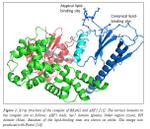The main idea of this project was that by inhibiting at least one of these two interactions of GluA2, the internalization of AMPAR will be reduced and therefore the synapse resistance will be increased, thus leading to improved cognitive functions.

Initiation of α-amino-3-hydroxy-5-methyl-4-isoxazolepropionic acid receptor (AMPAR) internalization requires the interaction of the C-terminus of GluA2 with two proteins:
The main idea of this project was that by inhibiting at least one of these two interactions of GluA2, the internalization of AMPAR will be reduced and therefore the synapse resistance will be increased, thus leading to improved cognitive functions.
CRU Hungary Kft Göd, Hungary
Lilla Ravasz, PhD Student
Dániel Mittl, PhD Student
Dominik Mátyás, PhD Student
Ildikó Papp, Dr.
Gábor Juhász,Dr,
Medicinal Chemistry Research Group, Research Centre for Natural Sciences, Budapest, Hungary
Dávid Bajusz, PhD Student
György Miklós Keserű, Dr.
Alexandru Ioan Cuza University, Iași, Romania
Lucian Hrițcu, Dr.
Generation of 2-3 peptides with the potential to improve cognitive functions
Highly effective inhibitors of AMPAR internalization were identified using structure-based design of peptides able to inhibit STEP-GluA2-CT complex formation. Two short peptide derivatives were found as efficient in vitro inhibitors. Our in vivo experiments evidenced that both peptides restore the memory deficits and display anxiolytic and antidepressant effects in a scopolamine-treated rat model. The interference peptides identified and characterized represent promising lead compounds for novel cognitive enhancers and/or behavioral modulators.
12 November 2024: Romanian Speaker; HSP Virtual Mentorship Series on Safeguarding University Technology Transfer & Intellectual Property; organized by Health Security Partners (HSP)-USA
23 May 2024: Romanian Speaker - Workshop "Safeguarding University Technology Transfer and Intellectual Property"; online, oral lecture on: " "ROMANIA Perspective: To Roles and Responsibilties, and Important Players"; organized by Health Security Partners (HSP)-USA;
13-16 July 2023: Poster presentation at the 37th Annual Protein Society Symposium at Boston (USA): „Rationally Designed Peptides Improve Cognition in Rats”, HS. Szedlacsek; D. Bajusz; RA. Badea; A. Pop; CC. Bică; L. Ravasz; D. Mittli; D. Mátyás; G. Necula-Petrăreanu; CV. Munteanu; I. Papp; G. Juhász; L. Hritcu; K. György; ȘE. Szedlacsek;
13 January 2022: Published papers: „Designed Peptide Inhibitors of STEP Phosphatase-GluA2 AMPA Receptor Interaction Enhance the Cognitive Performance in Rats”: Szedlacsek HS, Bajusz D, Badea RA, Pop A, Bică CC, Ravasz L, Mittli D, Mátyás D, Necula-Petrăreanu G, Munteanu CVA, Papp I, Juhász G, Hritcu L, Keserű GM, Szedlacsek SE, https://pubmed.ncbi.nlm.nih.gov/34962802/, https://doi.org/10.1021/acs.jmedchem.1c01303; Published online: 28 December 2021; Published in issue: IF = 7,45
16 june 2023: Seminar IBAR:
Oral lecture: "Designed Peptide Inhibitors of STEP Phosphatase-GluA2 AMPA Receptor Interaction Enhance the Cognitive Performance in Rats"; Professor Stefan Szedlacsek
2023 Invited lectures/speaker:
2016 Oral lecture:
Oral lecture on "New results in the field of STEP inhibitors and synaptic enlargement"; Proteomics Laboratory of the Institute of Biology at Eötvös Loránd University in Budapest, Hungary; 07-09 September 2016; Professor Stefan Szedlacsek
“Interference Peptides As Inhibitors of Interactions Related to AMPAR Endocytosis”, United States, Patent Application Publication, Pub.no: US2023/0159589 A1, Publication date: 25 may 2023; Inventator: Ștefan Eugen Szedlacsek, Rodica Aura-Badea, Horea-Stefan Szedlacsek, Lucian Hritcu: Link: https://patents.google.com/patent/US20230159589A1/en